英语介词用法归纳总结
40个英语介词用法总结
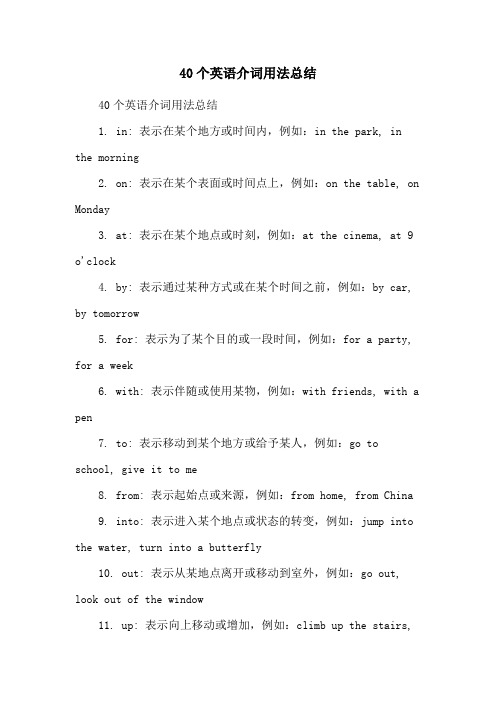
40个英语介词用法总结40个英语介词用法总结1. in: 表示在某个地方或时间内,例如:in the park, in the morning2. on: 表示在某个表面或时间点上,例如:on the table, on Monday3. at: 表示在某个地点或时刻,例如:at the cinema, at 9 o'clock4. by: 表示通过某种方式或在某个时间之前,例如:by car, by tomorrow5. for: 表示为了某个目的或一段时间,例如:for a party, for a week6. with: 表示伴随或使用某物,例如:with friends, with a pen7. to: 表示移动到某个地方或给予某人,例如:go to school, give it to me8. from: 表示起始点或来源,例如:from home, from China9. into: 表示进入某个地点或状态的转变,例如:jump into the water, turn into a butterfly10. out: 表示从某地点离开或移动到室外,例如:go out, look out of the window11. up: 表示向上移动或增加,例如:climb up the stairs,wake up12. down: 表示向下移动或减少,例如:walk down the hill, calm down13. about: 表示关于某事或在某个范围内,例如:talk about the movie, wander about the city14. off: 表示离开或关闭,例如:get off the bus, turnoff the lights15. on: 表示打开或激活,例如:turn on the TV, switch on the computer16. over: 表示越过或在某地上方,例如:jump over the fence, fly over the city17. under: 表示在某物下面或被控制或影响,例如:hide under the bed, live under his rules18. with: 表示具有某种特征或和某人一起做某事,例如:a man with blue eyes, dance with me19. without: 表示没有某物或在缺乏某物的情况下,例如:go without food, live without regret20. by: 表示通过某种方式,例如:learn by doing, go by bus21. through: 表示穿过某物或完成某事,例如:walk through the door, go through the documents22. across: 表示横穿某物或在某个范围内,例如:swimacross the river, all across the world23. between: 表示在两个事物之间或在某个时间段,例如:choose between two options, between 9 and 10 o'clock24. among: 表示在三个或三个以上事物之间或在某群人中,例如:share among friends, discuss among colleagues25. around: 表示在周围或在某个时间点附近,例如:walk around the park, around midnight26. through: 表示通过某事物或在某段时间内,例如:read through the book, work through the night27. against: 表示反对或靠在某物上,例如:fight against injustice, lean against the wall28. for: 表示代表或支持某人或某事,例如:vote for a candidate, fight for freedom29. towards: 表示朝向某个方向或对某人有好感,例如:walk towards the beach, feel towards someone30. within: 表示在某个时间或范围内,例如:arrive within an hour, within the city limits31. beyond: 表示超出某个界限或超过某个程度,例如:beyond expectations, beyond the horizon32. along: 表示沿着某个路线或伴随某人一起,例如:walk along the street, sing along with the song33. above: 表示在某物之上或高于某个程度,例如:flyabove the clouds, above average34. below: 表示在某物之下或低于某个程度,例如:swim below the surface, below freezing35. beside: 表示在某物旁边或和某人一起,例如:sit beside me, beside the lake36. near: 表示在某物附近或接近某个时间,例如:live near the beach, near the end37. past: 表示经过某个地点或在某个时间之后,例如:walk past the store, past midnight38. around: 表示在周围或大约某个数量,例如:look around the room, around 20 people39. after: 表示在某个时间之后或追求某人或某事,例如:after dinner, run after the dog40. before: 表示在某个时间之前或在某个事件之前,例如:before sunrise, before the meeting这些介词是英语中常用的一些基本介词,它们在表达地点、时间、方式等方面起到了重要的作用。
介词的常见用法总结

介词的常见用法总结介词在英语语法中扮演着重要的角色,用于表达名词、动词或其他词类之间的关系。
在本篇文章中,将总结介词的常见用法并提供相关的例句,以帮助读者更好地理解和运用介词。
一、位置及方向1. 在……之上(on):The book is on the table.(书在桌子上。
)2. 在……之下(under):The cat is under the chair.(猫在椅子下面。
)3. 在……之间(between):The sandwich is between the two plates.(三明治在两个盘子之间。
)4. 在……旁边(beside):She is sitting beside her sister.(她坐在她妹妹旁边。
)5. 在……之内(inside):The keys are inside the drawer.(钥匙在抽屉里。
)6. 在……之外(outside):They are playing outside the house.(他们在屋外玩耍。
)7. 在……之间(among):The book is among the other books on the shelf.(这本书在书架上其他书之间。
)二、时间1. 在……之前(before):I have to finish my homework before dinner.(我必须在晚饭前完成作业。
)2. 在……期间(during):She met her friends during the summer vacation.(她在暑假期间见到了她的朋友们。
)3. 在……之后(after):We usually go for a walk after dinner.(我们通常在晚饭后散步。
)4. 在……时刻(at):The movie starts at 8 o'clock.(电影八点开始。
)5. 在……期望完成的时间(by):He needs to submit the report by tomorrow.(他需要在明天之前提交报告。
介词用法总结

介词用法总结介词是连接词与词之间关系的一类虚词,它在句子中起到链接作用,并且具有一定的语法功能。
正确地使用介词可以使句子更加准确、清晰。
在英语中,有许多常用的介词,本文将对其中的一些常见介词及其用法进行总结。
一、介词用于表示地点和位置1. in:表示在某个范围或地点之内Examples:- The book is in the bag.- She lives in New York.2. at:表示在某个具体的地点Examples:- We met at the park.- He works at the office.3. on:表示在某个表面或者位置上Examples:- The cat is sitting on the chair.- The picture is on the wall.二、介词用于表示时间1. on:表示某一天或日期Examples:- I have a meeting on Monday.- We will celebrate New Year's Day on January 1st.2. at:表示具体的时刻Examples:- The train will arrive at 8 o'clock.- Let's meet at noon.3. in:表示较长的时间段Examples:- She will go on vacation in the summer.- We usually have a family dinner in the evening.三、介词用于表示原因和目的1. for:表示目的Examples:- I bought a new dress for the party.- He is studying hard for the exam.2. because of:表示因果关系- The match was canceled because of the rain.- She couldn't come to the party because of her illness.四、介词用于表示方式和手段1. by:表示通过某种方式或手段Examples:- I go to work by bus.- The letter was sent by email.2. with:表示使用某物或与某人一起Examples:- She wrote the letter with a pen.- He went to the park with his friends.五、介词用于表示关系和比较1. of:表示某物的一部分、属于或由...组成Examples:- The first chapter of the book is interesting.- The house is made of bricks.2. to:表示所属关系或比较- The tail belongs to the dog.- He is taller than his brother.六、其他常用介词1. with:表示同伴或陪伴关系Examples:- I went to the movies with my friends.- She enjoys traveling with her family.2. without:表示没有某种情况或物品Examples:- I can't live without music.- He ate lunch without a fork.总结:介词在英语中起到非常重要的作用,它可以连接词与词之间的关系,使句子更加准确和流畅。
超全的英语介词用法归纳总结
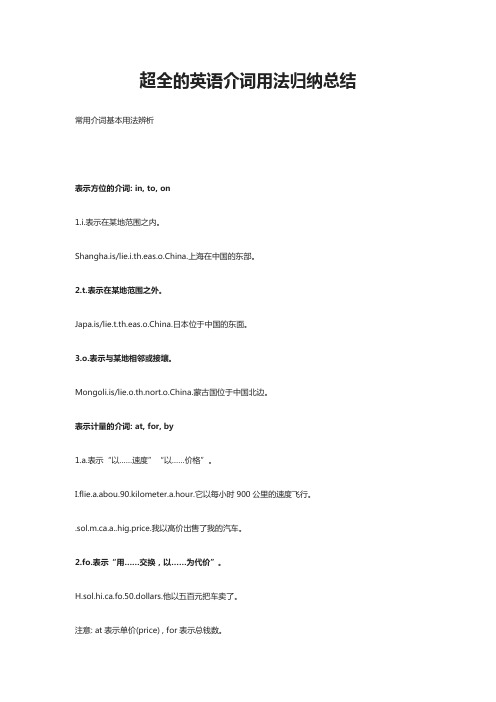
超全的英语介词用法归纳总结常用介词基本用法辨析表示方位的介词: in, to, on1.i.表示在某地范围之内。
Shangha.is/lie.i.th.eas.o.China.上海在中国的东部。
2.t.表示在某地范围之外。
Japa.is/lie.t.th.eas.o.China.日本位于中国的东面。
3.o.表示与某地相邻或接壤。
Mongoli.is/lie.o.th.nort.o.China.蒙古国位于中国北边。
表示计量的介词: at, for, by1.a.表示“以……速度”“以……价格”。
I.flie.a.abou.90.kilometer.a.hour.它以每小时900公里的速度飞行。
.sol.m.ca.a..hig.price.我以高价出售了我的汽车。
2.fo.表示“用……交换,以……为代价”。
H.sol.hi.ca.fo.50.dollars.他以五百元把车卖了。
注意: at表示单价(price) , for表示总钱数。
3.b.表示“以……计”, 后跟度量单位。
The.pai.hi.b.th.month.他们按月给他计酬。
Her.egg.ar.sol.b.weight.在这里鸡蛋是按重量卖的。
表示材料的介词: of, from, in1.o.成品仍可看出原料。
Thi.bo.i.mad.o.paper.这个盒子是纸做的。
2.fro.成品已看不出原料。
Win.i.mad.fro.grapes.葡萄酒是葡萄酿成的。
3.i.表示用某种材料或语言。
Pleas.fil.i.th.for.i.penci.first.请先用铅笔填写这个表格。
The.tal.i.English.他们用英语交谈。
表示工具或手段的介词: by, with, on1.b.用某种方式, 多用于交通。
.wen.ther.b.bus.我坐公共汽车去那儿。
2.with表示“用某种工具”。
H.brok.th.windo.wit..stone.他用石头把玻璃砸坏了。
介词英语的用法总结
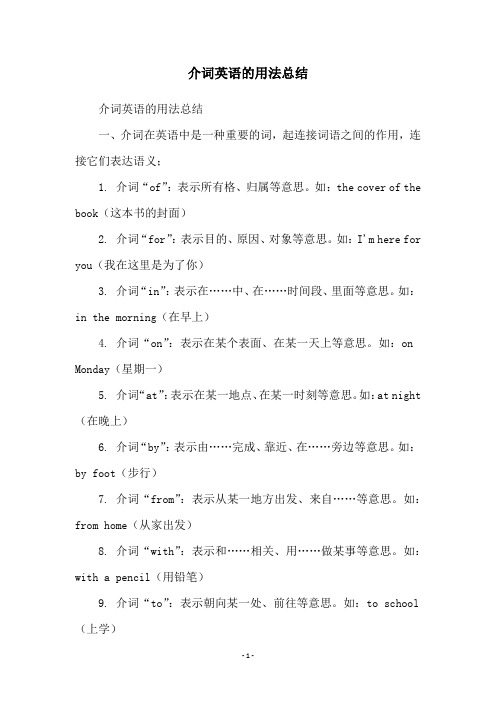
介词英语的用法总结介词英语的用法总结一、介词在英语中是一种重要的词,起连接词语之间的作用,连接它们表达语义;1. 介词“of”:表示所有格、归属等意思。
如:the cover of the book(这本书的封面)2. 介词“for”:表示目的、原因、对象等意思。
如:I'm here for you(我在这里是为了你)3. 介词“in”:表示在……中、在……时间段、里面等意思。
如:in the morning(在早上)4. 介词“on”:表示在某个表面、在某一天上等意思。
如:on Monday(星期一)5. 介词“at”:表示在某一地点、在某一时刻等意思。
如:at night (在晚上)6. 介词“by”:表示由……完成、靠近、在……旁边等意思。
如:by foot(步行)7. 介词“from”:表示从某一地方出发、来自……等意思。
如:from home(从家出发)8. 介词“with”:表示和……相关、用……做某事等意思。
如:with a pencil(用铅笔)9. 介词“to”:表示朝向某一处、前往等意思。
如:to school (上学)10.介词“for”:表示为了……、把……作为等意思。
如:for fun (为了好玩)11.介词“as”:表示作为、当……时等意思。
如:as a teacher (作为一个老师)12.介词“over”:表示在……上、穿过等意思。
如:over the bridge (过桥)13.介词“since”:表示从……起、既然等意思。
如:since then (从那时起)14.介词“into”:表示到……里面、转向等意思。
如:into the room(进房间)二、最后,需要强调的是,介词的使用要灵活搭配,以正确表达出英语句子的意思,以便达到更好的英语表达效果。
介词的用法归纳
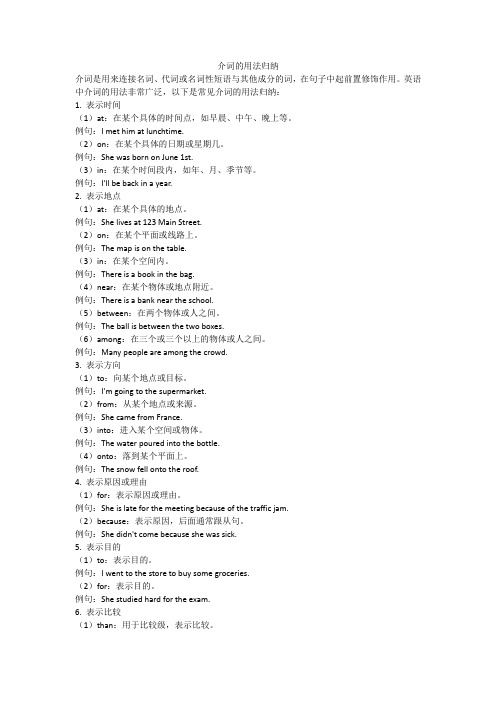
介词的用法归纳介词是用来连接名词、代词或名词性短语与其他成分的词,在句子中起前置修饰作用。
英语中介词的用法非常广泛,以下是常见介词的用法归纳:1. 表示时间(1)at:在某个具体的时间点,如早晨、中午、晚上等。
例句:I met him at lunchtime.(2)on:在某个具体的日期或星期几。
例句:She was born on June 1st.(3)in:在某个时间段内,如年、月、季节等。
例句:I'll be back in a year.2. 表示地点(1)at:在某个具体的地点。
例句:She lives at 123 Main Street.(2)on:在某个平面或线路上。
例句:The map is on the table.(3)in:在某个空间内。
例句:There is a book in the bag.(4)near:在某个物体或地点附近。
例句:There is a bank near the school.(5)between:在两个物体或人之间。
例句:The ball is between the two boxes.(6)among:在三个或三个以上的物体或人之间。
例句:Many people are among the crowd.3. 表示方向(1)to:向某个地点或目标。
例句:I'm going to the supermarket.(2)from:从某个地点或来源。
例句:She came from France.(3)into:进入某个空间或物体。
例句:The water poured into the bottle.(4)onto:落到某个平面上。
例句:The snow fell onto the roof.4. 表示原因或理由(1)for:表示原因或理由。
例句:She is late for the meeting because of the traffic jam.(2)because:表示原因,后面通常跟从句。
史上超全的英语介词用法归纳总结!不看太可惜了
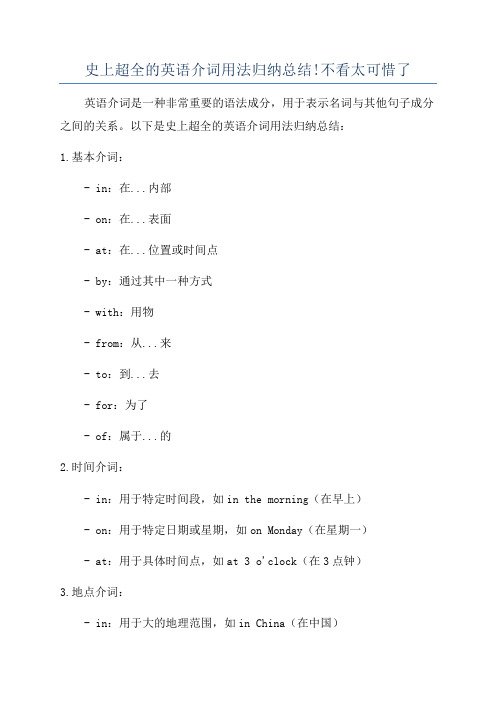
史上超全的英语介词用法归纳总结!不看太可惜了英语介词是一种非常重要的语法成分,用于表示名词与其他句子成分之间的关系。
以下是史上超全的英语介词用法归纳总结:1.基本介词:- in:在...内部- on:在...表面- at:在...位置或时间点- by:通过其中一种方式- with:用物- from:从...来- to:到...去- for:为了- of:属于...的2.时间介词:- in:用于特定时间段,如in the morning(在早上)- on:用于特定日期或星期,如on Monday(在星期一)- at:用于具体时间点,如at 3 o'clock(在3点钟)3.地点介词:- in:用于大的地理范围,如in China(在中国)- on:用于较小的地理范围或表面,如on the street(在街上)- at:用于具体地点,如at the supermarket(在超市)4.方向介词:- to:表示到达一些地方,如go to school(去学校)- into:表示进入一些地方,如go into the house(进入房子)- out of:表示离开一些地方,如get out of the car(离开车)5.原因介词:- because of:由于,如He is late because of the traffic(他因为交通堵塞而迟到)- due to:由于,如The flight was canceled due to bad weather(因为恶劣天气,航班被取消)6.动词短语介词:- look after:照顾,如She looks after her younger brother (她照顾她的弟弟)- take care of:照顾,如He takes care of his plants(他照顾他的植物)7.形容词短语介词:- interested in:对...感兴趣,如She is interested in music (她对音乐感兴趣)- good at:擅长...,如He is good at playing basketball(他擅长打篮球)8.其他常见介词用法:- with regard to:关于,如With regard to the matter, I have something to say(关于这件事,我有些话要说)- instead of:代替,如I will go instead of him(我将代替他去)- according to:根据,如According to the weather forecast, it will rain tomorrow(根据天气预报,明天会下雨)以上是一些常见的英语介词用法总结,希望能帮到你!。
英语介词的用法总结(完整版)
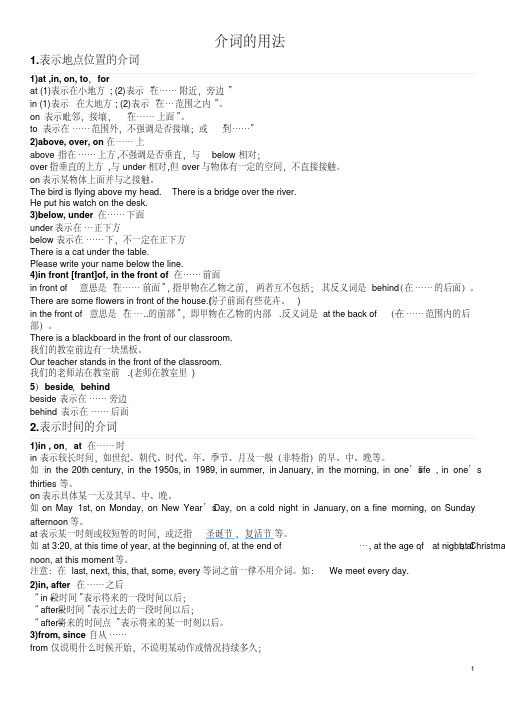
介词的用法1.表示地点位置的介词1)at ,in, on, to,forat (1)表示在小地方; (2)表示“在……附近,旁边”in (1)表示在大地方; (2)表示“在…范围之内”。
on 表示毗邻,接壤,“在……上面”。
to 表示在……范围外,不强调是否接壤;或“到……”2)above, over, on 在……上above 指在……上方,不强调是否垂直,与below相对;over指垂直的上方,与under相对,但over与物体有一定的空间,不直接接触。
on表示某物体上面并与之接触。
The bird is flying above my head. There is a bridge over the river.He put his watch on the desk.3)below, under 在……下面under表示在…正下方below表示在……下,不一定在正下方There is a cat under the table.Please write your name below the line.4)in front [frant]of, in the front of在……前面意思是“在……前面”,指甲物在乙物之前,两者互不包括;其反义词是behind(在……的后面)。
in front of…There are some flowers in front of the house.(房子前面有些花卉。
)in the front of 意思是“在…..的前部”,即甲物在乙物的内部.反义词是at the back of…(在……范围内的后部)。
There is a blackboard in the front of our classroom.我们的教室前边有一块黑板。
Our teacher stands in the front of the classroom.我们的老师站在教室前.(老师在教室里)5)beside,behindbeside 表示在……旁边behind 表示在……后面2.表示时间的介词1)in , on,at 在……时in表示较长时间,如世纪、朝代、时代、年、季节、月及一般(非特指)的早、中、晚等。
英语介词的用法归纳
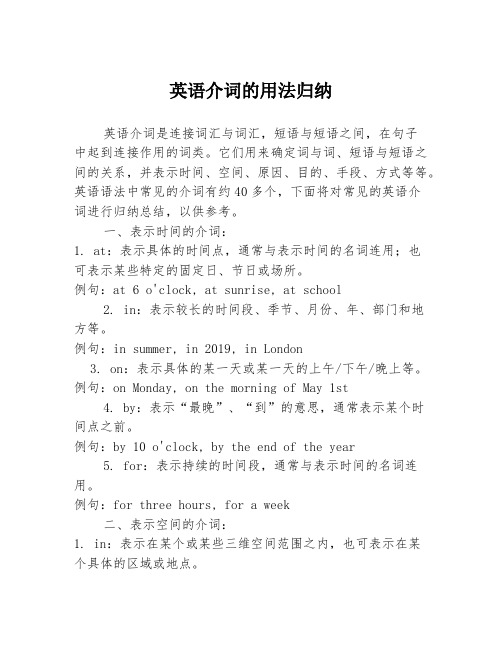
英语介词的用法归纳英语介词是连接词汇与词汇,短语与短语之间,在句子中起到连接作用的词类。
它们用来确定词与词、短语与短语之间的关系,并表示时间、空间、原因、目的、手段、方式等等。
英语语法中常见的介词有约40多个,下面将对常见的英语介词进行归纳总结,以供参考。
一、表示时间的介词:1. at:表示具体的时间点,通常与表示时间的名词连用;也可表示某些特定的固定日、节日或场所。
例句:at 6 o'clock, at sunrise, at school2. in:表示较长的时间段、季节、月份、年、部门和地方等。
例句:in summer, in 2019, in London3. on:表示具体的某一天或某一天的上午/下午/晚上等。
例句:on Monday, on the morning of May 1st4. by:表示“最晚”、“到”的意思,通常表示某个时间点之前。
例句:by 10 o'clock, by the end of the year5. for:表示持续的时间段,通常与表示时间的名词连用。
例句:for three hours, for a week二、表示空间的介词:1. in:表示在某个或某些三维空间范围之内,也可表示在某个具体的区域或地点。
例句:in the room, in the park2. on:表示在某个平面面上,通常用来表示地点。
例句:on the table, on the wall3. at:表示在某个具体的地点或位置。
例句:at the door, at the bus stop4. by:表示“靠近”、“经过”等含义。
例句:by the river, by the window5. between:表示在两个或两个以上的物体或位置之间。
例句:between two mountains, between the buildings6. among:表示在三个或三个以上的物体或位置之间。
语法|英语介词知识点用法总结!

语法|英语介词知识点用法总结!1.In(在,表示时间、地点、状态):- 表示具体的时间点或时间段:in the morning(早晨)、in May(五月)、in 2024(2024年)- 表示地点:in the park(在公园里)、in London(在伦敦)- 表示状态:in trouble(陷入困境)、in love(恋爱中)2.On(在,表示时间、地点、表面):- 表示具体的日期或星期几:on Monday(星期一)、on December25th(12月25日)- 表示地点:on the bus(在公交车上)、on Main Street(在主街上)- 表示表面:on the table(在桌子上)3.At(在,表示时间、地点):- 表示具体的时间:at 8 o'clock(在8点钟)、at noon(在中午)- 表示地点:at the cinema(在电影院)、at home(在家)4.To(到,表示方向或目的地):- 表示目的地:a trip to Paris(巴黎之行)、a letter to John (写给约翰的信)- 表示出发地:a flight from New York(从纽约起飞的航班)、a train from London(从伦敦开出的火车)- 表示原因:suffer from a cold(患感冒)6. For(为了,表示目的、受益人):- 表示目的:study for the exam(为考试而学习)、buy flowers for my mother(给母亲买花)- 表示受益人:a gift for you(给你的礼物)7. With(和,表示伴随、使用、具备):- 表示伴随:go shopping with friends(和朋友一起购物)、have dinner with family(和家人一起吃晚饭)- 表示使用:write with a pen(用钢笔写)- 表示具备:a girl with long hair(一位长发的女孩)以上是一些常见的英语介词及其用法总结,介词在句子中使用灵活多样,需要根据具体语境来选择适当的介词。
40个英语介词用法总结
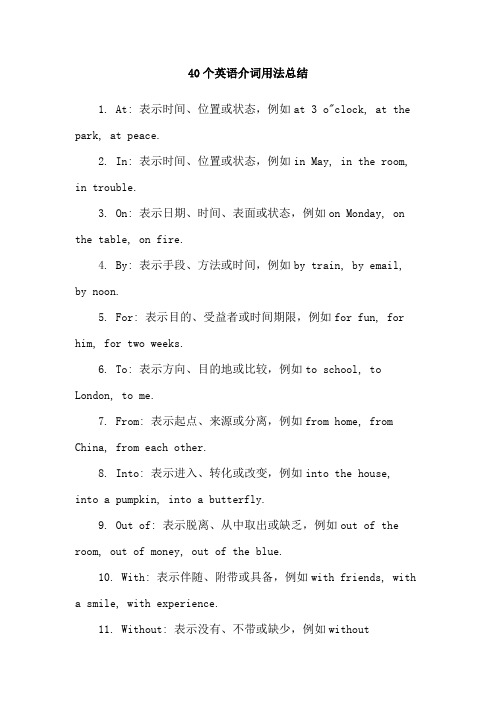
40个英语介词用法总结1. At: 表示时间、位置或状态,例如at 3 o"clock, at the park, at peace.2. In: 表示时间、位置或状态,例如in May, in the room, in trouble.3. On: 表示日期、时间、表面或状态,例如on Monday, on the table, on fire.4. By: 表示手段、方法或时间,例如by train, by email, by noon.5. For: 表示目的、受益者或时间期限,例如for fun, for him, for two weeks.6. To: 表示方向、目的地或比较,例如to school, to London, to me.7. From: 表示起点、来源或分离,例如from home, from China, from each other.8. Into: 表示进入、转化或改变,例如into the house,into a pumpkin, into a butterfly.9. Out of: 表示脱离、从中取出或缺乏,例如out of the room, out of money, out of the blue.10. With: 表示伴随、附带或具备,例如with friends, witha smile, with experience.11. Without: 表示没有、不带或缺少,例如withoutpermission, without shoes, without doubt.12. Over: 表示覆盖、超过或结束,例如over the roof, over the limit, over and done with.13. Under: 表示在下面、被支配或不足,例如under the table, under his control, under budget.14. About: 表示关于、大约或忙于,例如about the movie, about 10 dollars, about to leave.15. Above: 表示在上面、高于或超过,例如above the clouds, above average, above suspicion.16. Below: 表示在下面、低于或不足,例如below the surface, below freezing, below par.17. Across: 表示横穿、相交或涉及,例如across the street, across the board, across his mind.18. Beyond: 表示超出、远离或除了,例如beyond repair, beyond belief, beyond her control.19. Around: 表示周围、附近或环绕,例如around the corner, around the clock, around the world.20. Before: 表示以前、在前面或比较,例如before noon, before the house, before his time.21. Behind: 表示在后面、落后或背后,例如behind the house, behind schedule, behind the scenes.22. Beside: 表示在旁边、与...相比或附加,例如besidethe river, beside myself, beside the point.23. Inside: 表示内部、在里面或被包含,例如inside the box, inside the building, inside information.24. Outside: 表示外部、在外面或超出,例如outside the house, outside the box, outside the norm.25. Through: 表示穿过、经过或完成,例如through the door, through the park, through with it.26. Throughout: 表示遍布、贯穿或在整个期间,例如throughout the city, throughout history, throughout the day.27. Towards: 表示朝向、对于或接近,例如towards the sun, towards him, towards the end.28. Against: 表示反对、抵抗或紧挨着,例如against the law, against the current, against the wall.29. Among: 表示在...之中、相互之间或被分配到,例如among friends, among the stars, among the winners.30. Between: 表示在两者之间、在中间或相互之间,例如between two trees, between classes, between you and me.31. Within: 表示在内部、在范围之内或在规定时间内,例如within the house, within the budget, within a week.32. Without: 表示在外面、没有或不用,例如without the room, without a doubt, without further ado.33. Beneath: 表示在下面、低于或不足,例如beneath the surface, beneath his dignity, beneath contempt.34. Beside: 表示在旁边、与...相比或附加,例如beside the river, beside myself, beside the point.35. Into: 表示进入、转化或改变,例如into the house, into a pumpkin, into a butterfly.36. Upon: 表示在...之上、一旦发生或基于,例如upon the hill, upon arrival, upon further consideration.37. With: 表示伴随、附带或具备,例如with friends, witha smile, with experience.38. Within: 表示在内部、在范围之内或在规定时间内,例如within the house, within the budget, within a week.39. Without: 表示没有、不带或缺少,例如without permission, without shoes, without doubt.40. Beneath: 表示在下面、低于或不足,例如beneath the surface, beneath his dignity, beneath contempt.。
40个介词用法总结

40个介词用法总结介词是连接词类别中的一种,用来连接名词、代词、动词或动词词组并起到限定或修饰的作用,能够描绘出事物之间的空间、方向、时间、原因、目的、手段、方式、比较、伴随等关系。
介词在英语中有很多种,下面将总结40个常见的介词及其用法:1. about(关于):用于描述一个主题或问题。
例如:We had a discussion about the project.2. above(在……上面):用于描述物体的位置。
例如:The moon is above the clouds.3. across(横穿):表示从一边到另一边。
例如:We walked across the bridge.4. after(在……之后):表示在某个事件或时间之后。
例如:He went to the park after school.5. against(对抗):表示在某个物体或力量之间的对抗。
例如:They were playing against each other in the soccer game.6. along(沿着):表示沿着某个路径或边缘。
例如:We walked along the beach.7. among(在……之中):表示在同一群体中或在一些物体之间。
例如:They shared the prize among themselves.8. around(在……周围):表示围绕某个物体或区域。
例如:She ran around the track.9. before(在……之前):表示在某个事件或时间之前。
例如:Please finish your homework before dinner.10. behind(在……后面):表示在某个物体或地点的后面。
例如:He hid behind the tree.11. below(在……下面):表示在某个物体或地点的下面。
例如:The book is below the desk.12. beneath(在……下方):表示在某个物体的下方。
英语介词用法整理总结(超全面)
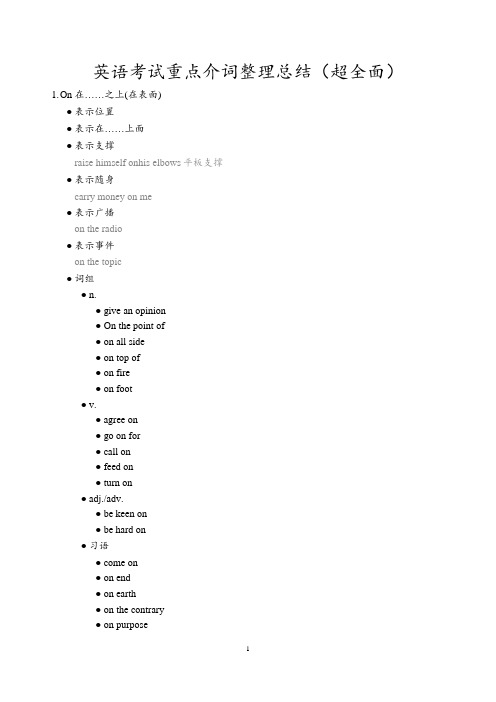
英语考试重点介词整理总结(超全面)1.O n 在……之上(在表面)●表示位置●表示在……上面●表示支撑raise himself onhis elbows平板支撑●表示随身carry money on me●表示广播on the radio●表示事件on the topic●词组●n.●give an opinion●On the point of●on all side●on top of●on fire●on foot●v.●agree on●go on for●call on●feed on●turn on●adj./adv.●be keen on●be hard on●习语●come on●on end●on earth●on the contrary●on purpose2.I n 在……里面●含义●表示位置●表示在作品中is the book●表示时间段●在状态in the trouble●表示方式in English , in print●表示穿着in a suit●词组●n.●arm in arm●a case in point一个典型的例子●in a hurry●in detail●in turn●in spite of●v.●abound in●get in touch with●keep in touch●adj/adv.●be abound in●be absorbed in专心致力于……3.A t 在(一个点)●含义●表示地点/场所●在旁边at the table●表示距离at certain distance, at an angle●表示时刻at 3am.●表示年龄at the age of 17●词组●at bottom●glance at●run out of 达到(某数字)●feel amused at●not at all4.o f 属于……的●含义●表示特征the aim of the course●表示从属特点Bank of China●表示数量a piece of paper●表示动作building of house●词组●n.●take advantage of●back of●take care of●v.●accuse sb. ofsth.●consist of●die of●adj./adv.●ahead of●be afraid of●be full of5.f or 为了●6.b y 依靠●含义●表示人He was brought up by his father.●表示手段by car●表示巧合I met by chance.碰运气。
介词的总结归纳
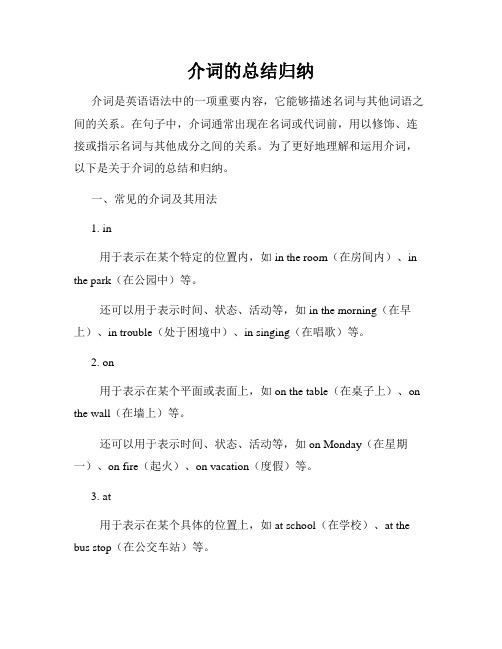
介词的总结归纳介词是英语语法中的一项重要内容,它能够描述名词与其他词语之间的关系。
在句子中,介词通常出现在名词或代词前,用以修饰、连接或指示名词与其他成分之间的关系。
为了更好地理解和运用介词,以下是关于介词的总结和归纳。
一、常见的介词及其用法1. in用于表示在某个特定的位置内,如 in the room(在房间内)、in the park(在公园中)等。
还可以用于表示时间、状态、活动等,如 in the morning(在早上)、in trouble(处于困境中)、in singing(在唱歌)等。
2. on用于表示在某个平面或表面上,如 on the table(在桌子上)、on the wall(在墙上)等。
还可以用于表示时间、状态、活动等,如 on Monday(在星期一)、on fire(起火)、on vacation(度假)等。
3. at用于表示在某个具体的位置上,如 at school(在学校)、at the bus stop(在公交车站)等。
还可以用于表示时间、活动等,如 at noon(在中午)、at a party (在派对上)等。
4. to用于表示运动的方向或目的地,如 go to school(去学校)、senda letter to her(给她发信)等。
还可以用于表示时间,如from Monday to Friday(从周一到周五)等。
5. for用于表示目的、原因或受益人,如 buy flowers for her(给她买花)、study for the exam(为了考试而学习)等。
6. with用于表示伴随、一起、使用等,如 go shopping with friends(和朋友一起去购物)、write with a pen(用钢笔写)等。
7. by用于表示通过某种方式或由某人完成某事,如 travel by train(乘火车旅行)、written by Mark(由马克写的)等。
介词用法归纳与总结

介词用法归纳与总结介词是英语中非常重要的一部分,它用于连接名词或代词与其他句子成分,表达位置、时间、原因、方式等概念。
正确使用介词能够准确表达自己的意思,加强句子的连贯性和表达的精确度。
本文将对常见的介词及其用法进行归纳与总结。
1. 位置关系介词用于表示物体或人的位置关系,常见的介词有:in、on、at、under、over等。
- in:表示在某个区域或范围内。
例如:in the park(在公园里)、in the house(在房子里)。
- on:表示在某个表面或位置上。
例如:on the table(在桌子上)、on the beach(在海滩上)。
- at:表示在某个具体位置。
例如:at the bus stop(在公车站)、at school(在学校)。
- under:表示在某物之下。
例如:under the tree(在树下)、under the bed(在床下)。
- over:表示在某物之上。
例如:over the bridge(在桥上)、over the clouds(在云上)。
2. 时间关系介词用于表示时间关系,常见的介词有:at、on、in、before、after、during等。
- at:表示具体时间点。
例如:at 7 o'clock(在7点)、at midnight (在午夜)。
- on:表示某个具体的日期或星期几。
例如:on Monday(在星期一)、on Christmas Day(在圣诞节)。
- in:表示一个时间段或月份。
例如:in the morning(在早上)、in July(在七月)。
- before:表示在某个时间之前。
例如:before sunset(在日落之前)、before the meeting(在会议之前)。
- after:表示在某个时间之后。
例如:after breakfast(在早餐之后)、after the show(在演出之后)。
英语介词用法最全总结
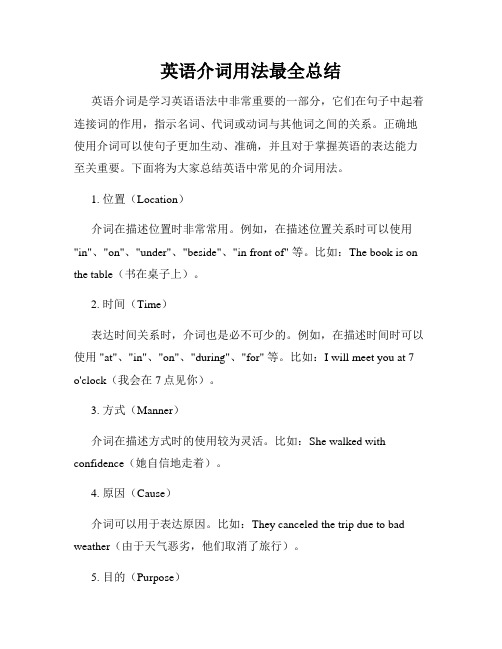
英语介词用法最全总结英语介词是学习英语语法中非常重要的一部分,它们在句子中起着连接词的作用,指示名词、代词或动词与其他词之间的关系。
正确地使用介词可以使句子更加生动、准确,并且对于掌握英语的表达能力至关重要。
下面将为大家总结英语中常见的介词用法。
1. 位置(Location)介词在描述位置时非常常用。
例如,在描述位置关系时可以使用"in"、"on"、"under"、"beside"、"in front of" 等。
比如:The book is on the table(书在桌子上)。
2. 时间(Time)表达时间关系时,介词也是必不可少的。
例如,在描述时间时可以使用 "at"、"in"、"on"、"during"、"for" 等。
比如:I will meet you at 7 o'clock(我会在7点见你)。
3. 方式(Manner)介词在描述方式时的使用较为灵活。
比如:She walked with confidence(她自信地走着)。
4. 原因(Cause)介词可以用于表达原因。
比如:They canceled the trip due to bad weather(由于天气恶劣,他们取消了旅行)。
5. 目的(Purpose)介词也能表达目的。
比如:He went to the store to buy some groceries (他去商店买些食品)。
6. 所属关系(Possession)介词可以用于表达所属关系。
比如:This book belongs to me(这本书是我的)。
7. 比较(Comparison)在进行比较时,介词也可以派上用场。
比如:I am taller than my sister(我比我妹妹高)。
英语介词的用法归纳
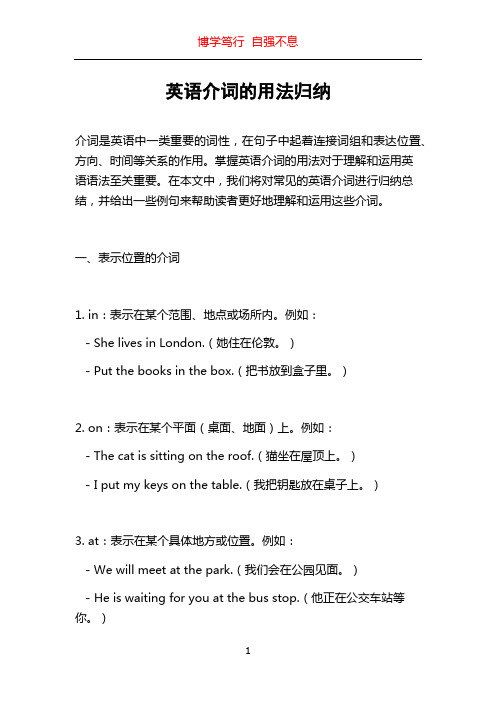
英语介词的用法归纳介词是英语中一类重要的词性,在句子中起着连接词组和表达位置、方向、时间等关系的作用。
掌握英语介词的用法对于理解和运用英语语法至关重要。
在本文中,我们将对常见的英语介词进行归纳总结,并给出一些例句来帮助读者更好地理解和运用这些介词。
一、表示位置的介词1. in:表示在某个范围、地点或场所内。
例如:- She lives in London.(她住在伦敦。
)- Put the books in the box.(把书放到盒子里。
)2. on:表示在某个平面(桌面、地面)上。
例如:- The cat is sitting on the roof.(猫坐在屋顶上。
)- I put my keys on the table.(我把钥匙放在桌子上。
)3. at:表示在某个具体地方或位置。
例如:- We will meet at the park.(我们会在公园见面。
)- He is waiting for you at the bus stop.(他正在公交车站等你。
)二、表示方向的介词1. to:表示动作的方向。
例如:- I went to the supermarket.(我去了超市。
)- She walked to the park.(她走到了公园。
)2. into:表示进入某个地方或物体内部。
例如:- The cat jumped into the box.(猫跳进了盒子里。
)- He put the book into his bag.(他把书放进了书包里。
)3. out of:表示离开某个地方或物体外部。
例如:- She ran out of the room.(她从房间里跑了出来。
)- Take the dishes out of the dishwasher.(把盘子从洗碗机里取出来。
)三、表示时间的介词1. at:表示具体的时间点。
例如:- The party starts at 7 p.m.(晚会从晚上7点开始。
常用介词用法总结
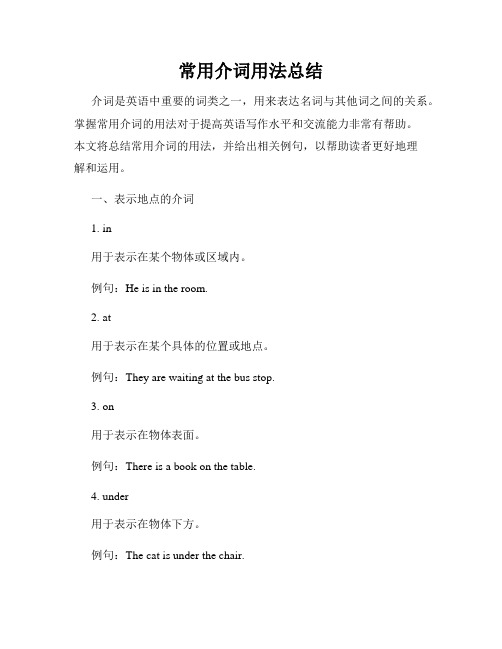
常用介词用法总结介词是英语中重要的词类之一,用来表达名词与其他词之间的关系。
掌握常用介词的用法对于提高英语写作水平和交流能力非常有帮助。
本文将总结常用介词的用法,并给出相关例句,以帮助读者更好地理解和运用。
一、表示地点的介词1. in用于表示在某个物体或区域内。
例句:He is in the room.2. at用于表示在某个具体的位置或地点。
例句:They are waiting at the bus stop.3. on用于表示在物体表面。
例句:There is a book on the table.4. under用于表示在物体下方。
例句:The cat is under the chair.5. above用于表示在物体上方。
例句:The bird is flying above the tree.6. below用于表示在物体下方。
例句:The fish is swimming below the water surface.二、表示时间的介词1. at用于表示具体的时间点。
例句:We have a meeting at 9 o'clock.2. on用于表示具体的日期或星期几。
例句:We usually have a party on Christmas Day. 3. in用于表示月份、年份或季节等较长的时间段。
例句:She was born in 1990.4. during用于表示在某一时间段内。
例句:We went skiing during the winter vacation.三、表示原因的介词1. because of用于表示因为某个原因。
例句:He couldn't come because of the heavy rain.2. due to用于表示由于某个原因。
例句:The cancellation of the flight was due to the bad weather.四、表示方式的介词1. by用于表示通过某种方式或方法。
介词英语知识点总结
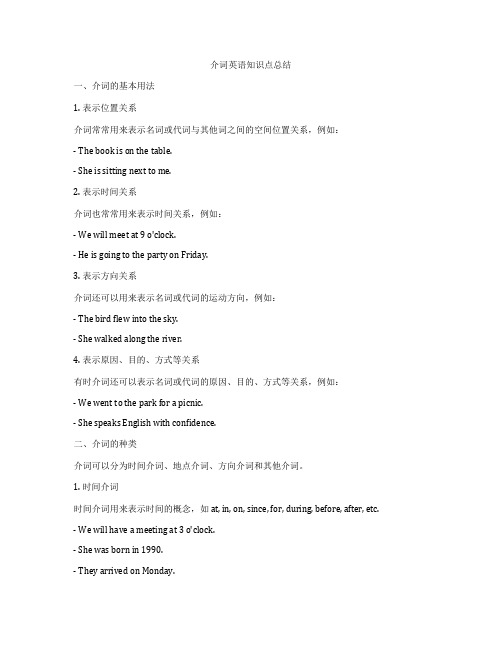
介词英语知识点总结一、介词的基本用法1. 表示位置关系介词常常用来表示名词或代词与其他词之间的空间位置关系,例如:- The book is on the table.- She is sitting next to me.2. 表示时间关系介词也常常用来表示时间关系,例如:- We will meet at 9 o'clock.- He is going to the party on Friday.3. 表示方向关系介词还可以用来表示名词或代词的运动方向,例如:- The bird flew into the sky.- She walked along the river.4. 表示原因、目的、方式等关系有时介词还可以表示名词或代词的原因、目的、方式等关系,例如:- We went to the park for a picnic.- She speaks English with confidence.二、介词的种类介词可以分为时间介词、地点介词、方向介词和其他介词。
1. 时间介词时间介词用来表示时间的概念,如 at, in, on, since, for, during, before, after, etc. - We will have a meeting at 3 o'clock.- She was born in 1990.- They arrived on Monday.2. 地点介词地点介词用来表示地点的概念,如 in, on, at, by, near, under, over, etc.- The cat is in the box.- He put the book on the table.- She is waiting at the bus stop.3. 方向介词方向介词用来表示运动方向的概念,如 into, out of, through, along, towards, etc.- The dog jumped into the water.- She walked out of the room.- They ran towards the beach.4. 其他介词其他介词包括原因、目的、方式等介词,如 for, with, without, by means of, because of, etc.- We are going to the cinema for a movie.- She wrote the letter with a pen.- He won the game by means of hard work.三、介词的常见错误在使用介词的过程中,很容易出现一些错误,下面列举一些常见的介词错误以及正确的使用方式。
介词 超全的英语介词用法归纳总结~优秀6篇
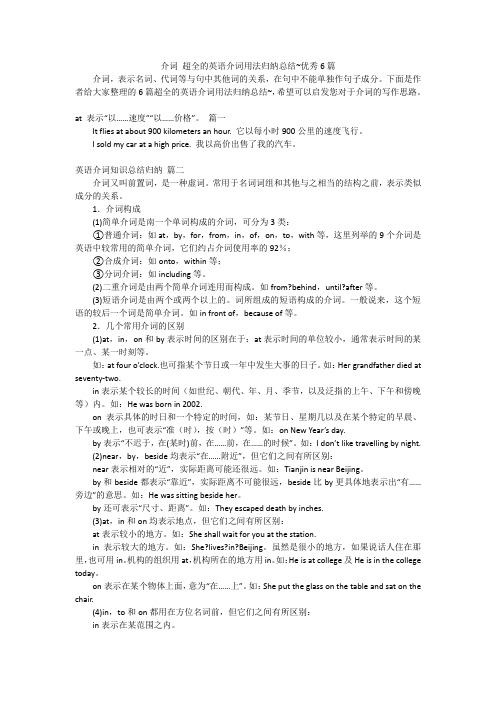
介词超全的英语介词用法归纳总结~优秀6篇介词,表示名词、代词等与句中其他词的关系,在句中不能单独作句子成分。
下面是作者给大家整理的6篇超全的英语介词用法归纳总结~,希望可以启发您对于介词的写作思路。
at 表示“以……速度”“以……价格”。
篇一It flies at about 900 kilometers an hour. 它以每小时900公里的速度飞行。
I sold my car at a high price. 我以高价出售了我的汽车。
英语介词知识总结归纳篇二介词又叫前置词,是一种虚词。
常用于名词词组和其他与之相当的结构之前,表示类似成分的关系。
1.介词构成(1)简单介词是南一个单词构成的介词,可分为3类:①普通介词:如at,by,for,from,in,of,on,to,with等,这里列举的9个介词是英语中较常用的简单介词,它们约占介词使用率的92%;②合成介词:如onto,within等;③分词介词:如including等。
(2)二重介词是由两个简单介词连用而构成。
如from?behind,until?after等。
(3)短语介词是由两个或两个以上的。
词所组成的短语构成的介词。
一般说来,这个短语的较后一个词是简单介词。
如in front of,because of等。
2.几个常用介词的区别(1)at,in,on和by表示时间的区别在于:at表示时间的单位较小,通常表示时间的某一点、某一时刻等。
如:at four o’clock.也可指某个节日或一年中发生大事的日子。
如:Her grandfather died at seventy-two.in表示某个较长的时间(如世纪、朝代、年、月、季节,以及泛指的上午、下午和傍晚等)内。
如:He was born in 2002.on表示具体的时日和一个特定的时间,如:某节日、星期几以及在某个特定的早晨、下午或晚上,也可表示“准(时),按(时)”等。
- 1、下载文档前请自行甄别文档内容的完整性,平台不提供额外的编辑、内容补充、找答案等附加服务。
- 2、"仅部分预览"的文档,不可在线预览部分如存在完整性等问题,可反馈申请退款(可完整预览的文档不适用该条件!)。
- 3、如文档侵犯您的权益,请联系客服反馈,我们会尽快为您处理(人工客服工作时间:9:00-18:30)。
英语介词用法归纳总结
在英语中,介词(preposition)虽然是一种小词,但在作用和运用上的复杂性却不可小看!可以毫不夸张地说,离开了介词的中介或连接作用,就无法表达某些最基本的思想或概念。
一、常用介词基本用法辨析
表示方位的介词:in, to, on
1. in 表示在某地范围之内。
例:Shanghai is/lies in the east of China.上海在中国的东部。
2. to 表示在某地范围之外。
例:Japan is/lies to the east of China.日本位于中国的东面。
3. on 表示与某地相邻或接壤。
例:Mongolia is/lies on the north of China.蒙古国位于中国北边。
二、表示计量的介词:at, for, by
1. at 表示“以……速度”“以……价格”。
例:It flies at about 900 kilometers an hour.它以每小时900公里的速度飞行。
I sold my car at a high price.我以高价出售了我的汽车。
2. for 表示“用……交换,以……为代价”。
例:He sold his car for 500 dollars.他以五百元把车卖了。
注意:at表示单价(price),for表示总钱数。
3. by 表示“以……计”,后跟度量单位。
例:They paid him by the month.他们按月给他计酬。
Here eggs are sold by weight.在这里鸡蛋是按重量卖的。
三、表示材料的介词:of, from, in
1. of 成品仍可看出原料。
例:This box is made of paper.这个盒子是纸做的。
2. from 成品已看不出原料。
例:Wine is made from grapes.葡萄酒是葡萄酿成的。
3. in 表示用某种材料或语言。
例:Please fill in the form in pencil first.请先用铅笔填写这个表格。
They talk in English. 他们用英语交谈。
四、表示工具或手段的介词:by, with, on
1. by 用某种方式,多用于交通。
例:I went there by bus.我坐公共汽车去那儿。
2. with表示“用某种工具”。
例:broke the window with a stone.他用石头把玻璃砸坏了。
注意:with表示用某种工具时,必须用冠词或物主代词。
3. on 表示“以……方式”,多用于固定词组。
例:They talked on the telephone.他们通过电话进行交谈。
She learns English on the radio/on TV.她通过收音机/电视学英语。
五、表示关于的介词:of, about, on
1. of 仅是提到或谈到过某人或某事。
例:He spoke of the film the other day.他前几天提到了这部影片。
2. about 指“关于”某人或某事物的较详细的情况。
例:Can you tell me something about yourself?你能告诉我关于你自己的事情吗?
3. on 指“关于”学术性的或严肃的事。
例:It’s a textbook on the history of china.它是一本有关中国历史的教科书。
六、表原因或理由的介词:for, at, from, of, with, by, because of
1. for 表示原因,与sorry, famous, punish, praise, thank, blame连
用。
例:I am sorry for what I said to you.我后悔不该对你讲那些话。
2. at 指情感变化的原因,意为“因听到或看到而……”。
例:He was surprised at the news.听到这消息他大吃一惊。
3. from 指“外在的原因”,如受伤、车祸等。
例:He died from the wound.他因受伤而致死。
4. of 指“内在的原因”,如病、饿等。
例:The old man died of hunger.老人死于饥饿。
5. with 指生理上或情感上的由外界到内心的原因。
例:Hearing the news, he jumped with joy.他们听到这个消息,欣喜若狂。
He was shaking with anger.他气得浑身发抖。
6. by 表示外部的,尤其是暴力的或无意中造成某种结果的原因。
例:Her body was bent by age.他因年老背弯了。
She took your umbrella by mistake.我因弄错拿了你的雨伞。
7. because of 表示引起结果的直接原因。
